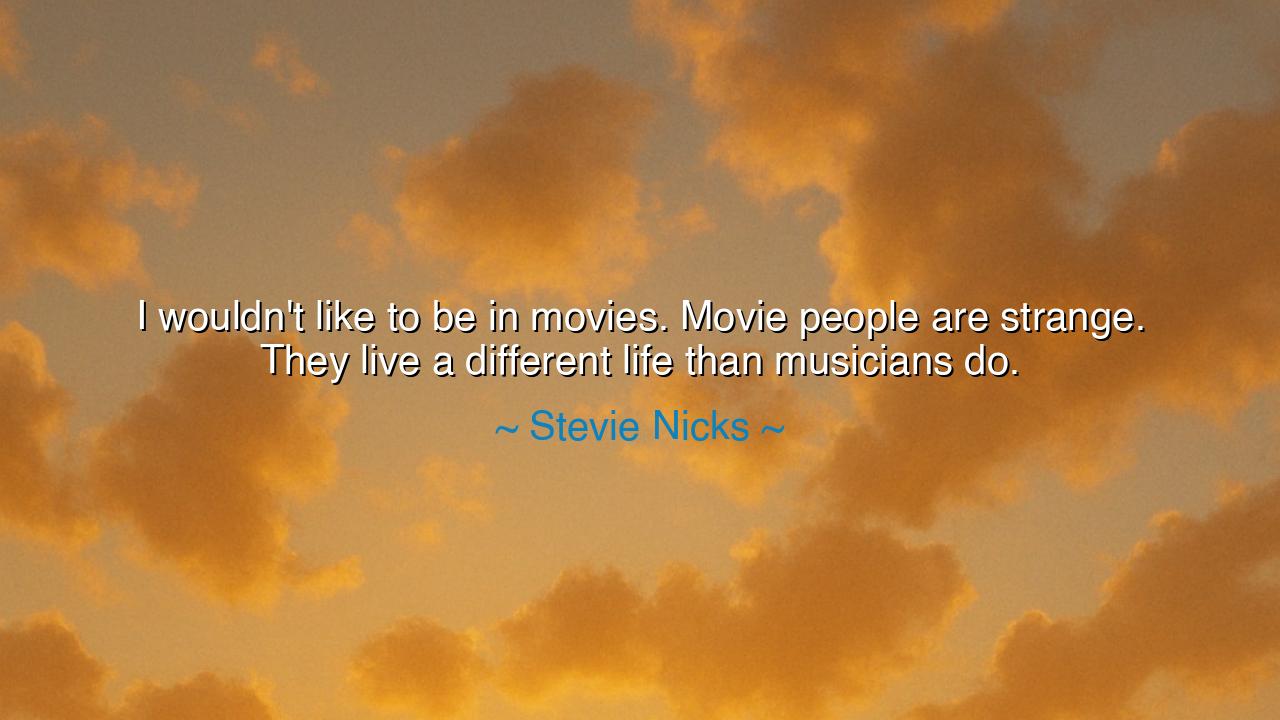
I wouldn't like to be in movies. Movie people are strange. They
I wouldn't like to be in movies. Movie people are strange. They live a different life than musicians do.






Listen, O seekers of wisdom, for in the words of Stevie Nicks lies a powerful reflection on the nature of identity, art, and the unique paths that artists walk in their respective worlds. She spoke thus: "I wouldn't like to be in movies. Movie people are strange. They live a different life than musicians do." In these words, Nicks speaks to the fundamental difference between two great worlds of creativity—music and film—and the unique lives those who inhabit them lead. The world of music, with its raw expression and often solitary craft, is a world that, for Nicks, resonates more deeply than the structured, sometimes artificial nature of filmmaking. It is a confession about the ways in which different forms of art shape the lives of those who practice them, and how those lives, in turn, shape the art itself.
In the ancient world, there were those who lived for the arts of storytelling, like Homer, the poet who gave voice to the ancient tales of gods and heroes. Homer's world was one of great imagination and oral tradition, where stories were passed down through performance, where words carried power and could evoke the deepest emotions in an audience. But even within this world, there were distinctions between those who sang the tales and those who wrote them down, between those who created music and those who created words. Just as Homer’s world was divided between poets and actors, so too does the world of Stevie Nicks distinguish between the musician and the actor—two different crafts, each with its own lifestyle, its own demands, and its own way of being.
Consider the great philosophers, like Plato, who, in his Republic, wrote about the nature of art and the role of the artist in society. Plato divided artists into two categories: the poets, who create from the depth of their souls, and the craftsmen, who create through skill and technique. His argument was that the poet’s world is one of truth and inspiration, while the craftsman’s world is one of illusion and imitation. In many ways, Nicks’ sentiment about the difference between musicians and actors echoes this ancient division. Musicians, like poets, are creators of authentic expression, while actors, like craftsmen, often perform within the confines of someone else’s vision. For Nicks, the world of acting may feel like one of artifice compared to the genuine connection felt through the musical craft.
The distinction between the life of a musician and the life of an actor can also be seen in the story of Orpheus, the legendary musician in Greek mythology. Orpheus was a figure of pure musical genius, whose songs could charm even the gods. But his music was his own creation—an expression of soul and truth. When he ventured into the underworld to retrieve his wife, Eurydice, it was his music—his connection to the divine—that enabled him to navigate the dark realms. In contrast, actors in ancient Greece, performing in the theater of Dionysus, were often bound by the script and structure of the playwright’s vision. Though both worlds demanded great talent, one was a world of unbridled expression, while the other required the discipline of performance. Nicks’ words reflect this truth—the world of musicians, like Orpheus’, is one where the soul can truly be free, while the world of actors, like the ancient playwrights, is one where the artist inhabits a role defined by others.
Consider also the tale of King Midas, whose insatiable desire for wealth turned everything he touched into gold. Though his story is one of great greed, it also illustrates the danger of becoming too absorbed in the external, material world—the world of appearance and performance, which is what the world of film can often feel like. For Midas, the very thing that he sought—external glory—became his curse. Likewise, in the world of acting, the pursuit of recognition and fame can sometimes trap the artist in a life that is more about public image than true self-expression. For Nicks, this is a warning: that the world of film may demand too much personal sacrifice, too much compromise of one’s authenticity, a dangerous game of playing roles rather than living them.
Now, O children of the future, heed this lesson: Do not fall into the trap of thinking that success is defined by the expectations of others. Just as Stevie Nicks found fulfillment in the music world, an environment that allowed her to express her true self, so too must you find your own path in life—one that allows you to be authentic and true to your craft, whether in art, music, writing, or any other endeavor. There is no one path to greatness, for greatness is found in the alignment of your soul’s purpose and the work you choose to devote yourself to. Just as Orpheus was lost to the underworld because he couldn’t fully balance his love for his art with his love for his wife, do not lose yourself in the performance of life. Seek a path that allows you to live true, to create from the heart, and to embrace the craft that calls you.
So, young ones, understand this: Art comes in many forms, and each form has its own world, its own life, its own costs. Whether you are a musician, a writer, an actor, or any other form of creator, understand that authenticity is key. Be true to yourself, for in the end, it is not the roles you play, but the life you lead and the soul you express, that will define your true success. Embrace your craft with passion, but never let the world around you define who you are or what you must become.






AAdministratorAdministrator
Welcome, honored guests. Please leave a comment, we will respond soon